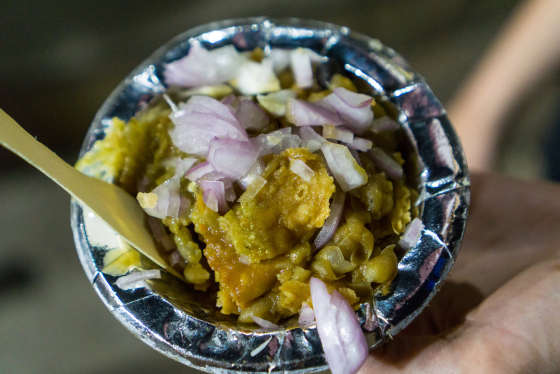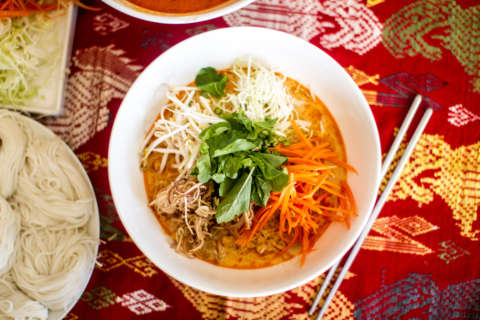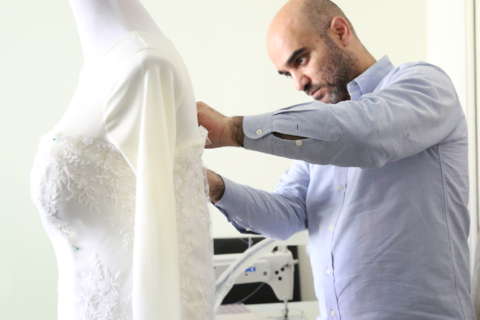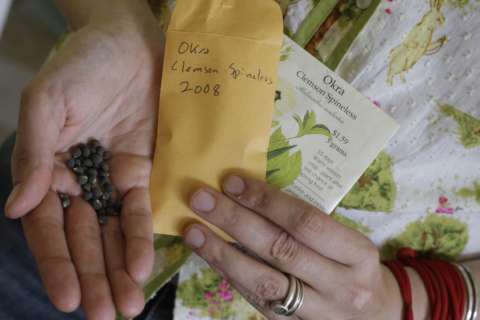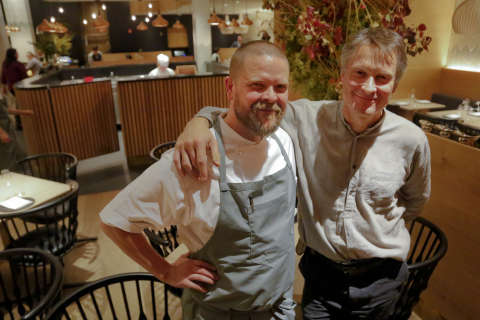WASHINGTON — There’s no such thing as a free lunch, but at a new Georgetown eatery, you can get pretty close.
Falafel Inc. opened its doors at Potomac and M streets about a week ago, and already, Washingtonians are lining up to sink their teeth into the shop’s $3 falafel sandwiches, stuffed with lettuce, red cabbage, cucumber, tomato, tahini and red sauce on a freshly baked pita.
But what’s even more appetizing than the authentic and budget-friendly food is Falafel Inc.’s mission: Every $10 spent at Falafel Inc. feeds a refugee for a day through the restaurant’s donations to the World Food Programme.
Falafel Inc.’s founder, Ahmad Ashkar, is no stranger to solving some of the world’s most complicated problems through business. Ashkar is the CEO of the Hult Prize Foundation, an organization that offers college students and aspiring social entrepreneurs the chance at $1 million in startup money to launch sustainable, for-profit businesses that solve a global challenge outlined by former U.S. President Bill Clinton.
This year’s topic focused on restoring dignity to 10 million refugees in the next five years. Ashkar couldn’t compete in the challenge, but that didn’t stop him from finding his own way to tackle the task. The son of Palestinian immigrants always wanted to open an authentic hummus and falafel shop in D.C. This was his way to join the two tracks.
“Falafel is an interesting thing. I think food, in general, is an ultimate equalizer. Falafel, in particular, it’s actually the go-to food of choice for refugees, and it’s not because it’s so delicious or refreshing or vegan or healthy — it’s because it’s cheap,” Ashkar said.
“And what we thought to do was create a vehicle where people in the West could experience falafel, but experience it through the eyes of a refugee.”
The tiny shop’s walls are covered in OSB, or plywood, just like the stands in refugee camps. Light bulbs hang from the ceiling on string and photos of camps decorate the walls. A wok from Palestine and a bread oven from Beirut take up the majority of the tiny kitchen, which turns out 2,000 to 3,000 falafels a day.
There are a few standing-only tables sprinkled throughout the small space and a couple of tables outside, but for the most part, Falafel Inc. is a no-frills grab-and-go joint.
The time and attention Ashkar saved on décor, he pours into the food. Most of the recipes — from the falafels to the hummus — come from Ashkar’s mom and grandmother.
“We don’t cut corners. We do it the way that our mom and our grandma and her mother before her did it. This is the Palestinian way of falafel and hummus,” said Ashkar, who added that his mother was known throughout her hometown for her culinary skills.
Diners used to highly customizable fast-casual dining options be forewarned: Falafel Inc. isn’t that type of spot.
“There’s really only one way to eat a falafel sandwich, and that’s the way that we build them,” Ashkar said.
In addition to the one sandwich option, the menu also includes a bowl for $4 (falafel, red cabbage, tabbouleh, tomato, cucumber, pickles and za’atar chips on greens) and eight different sides, including hummus and salads (Pali salad, tabbouleh salad, cucumber salad, etc.) for $3.
Ashkar keeps the costs low for consumers by offering a product that’s relatively inexpensive to make.
“Anyone who’s traveled around the world knows that your average falafel sandwich is anywhere from $0.15 to $0.20 if you’re in Jordan or if you’re in Palestine … If you’re in Cairo, you can get a falafel sandwich for $0.05,” Ashkar said.
“If they can afford to eat falafel in the refugee camps, I can certainly afford to sell falafel for $3.”
Not to be missed are the $3 za’atar fries. Ashkar imports the spice blend direct from his aunt’s farm in Palestine and sprinkles it over piping hot french fries. The homemade white garlic sauce is the perfect accompaniment, but really, any of the six sauces will do.
A personal favorite of Ashkar’s is the shop’s spicy, garlicky “habibi” sauce, which in Arabic translates to “sweetheart” or “loved one.” It’s another recipe straight from his grandmother’s kitchen.
“I used to always ask my teita [grandma] to make it for me. I used to say to her, ‘Teita, I want that special sauce,’ and she’d say, ‘Here it is, habibi.’”
Ashkar says in the first week, the shop was able to feed 1,000 refugees. This is a number he hopes to grow with more stores throughout the country.
Plans for a Falafel Inc. in Boston and Palo Alto, California, are already in the works, as is the intention to work with mosques, synagogues and churches to help recruit and employ local refugees.
Ashkar says he hopes his new business not only lends a taste of his home and heritage to D.C., but also inspires others to launch for-profit businesses with a social mission.
“The [refugee] crisis is not getting smaller,” Ashkar said.
“As you look at where we are today and the number of refugees coming out of Syria and other war-torn nations, you begin to realize that this is the beginning, not the end. Twelve out of 18 countries in the Middle East are at war. … We really need to do something now before it’s too late.”

